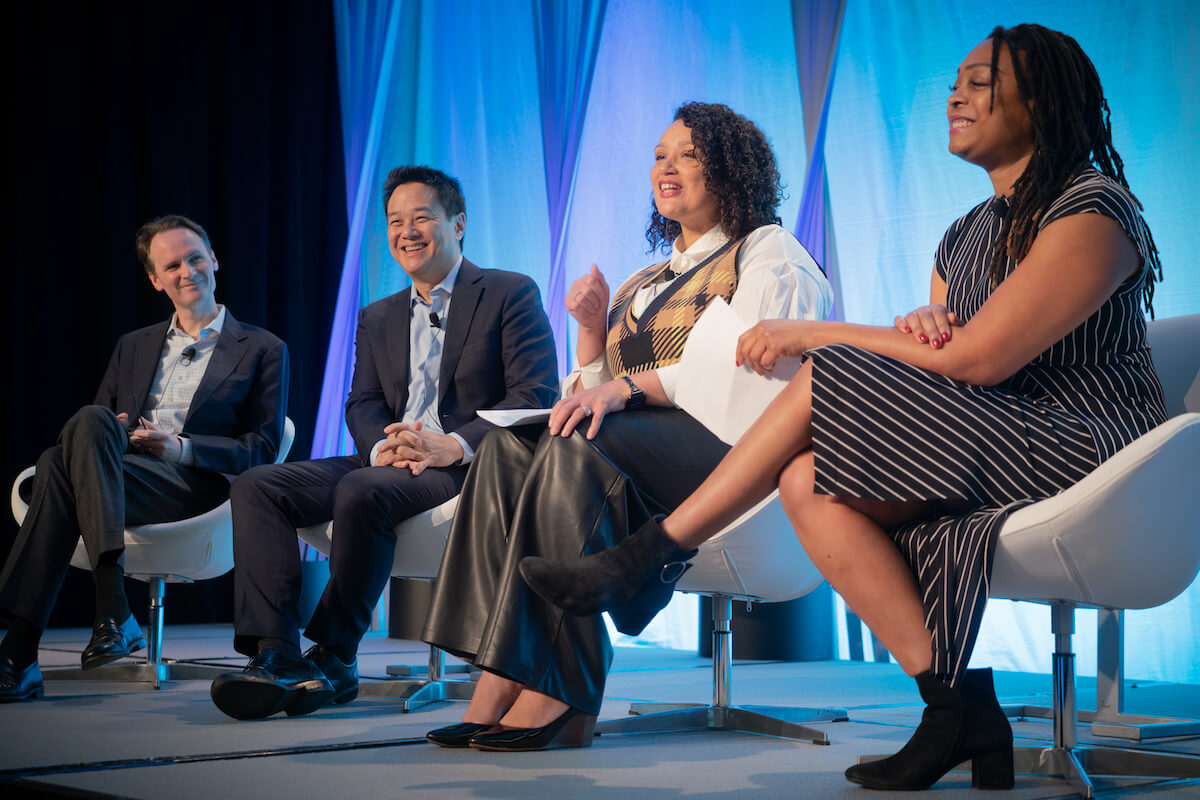Hello ImpactAlpha readers! It’s getting late, so let’s jump right in.
#Dealflow: Follow the Money
Impossible Foods raises a juicy $75 million for its meatless burgers. Big investors and big ticket sizes are matching the big “alternative protein” opportunity as growing incomes and populations drive demand for protein. With the meat industry contributing nearly one-fifth of global greenhouse gases, there’s a rush on for less resource-intensive, healthier alternatives.Redwood City-based Impossible has raised more than $300 million to date for its “juicy” burgers engineered from plants. For Bill Gates, the world’s wealthiest man (on some days) it was his second plant-based burger investment (the other: Beyond Meat). Gates was joined by Temasek, the $200 billion Singapore state-owned wealth fund, Khosla Ventures and Horizon Ventures. Impossible Foods’ new factory in Oakland is expected to produce a million pounds of “plant meat” each month.
Hustle raises $8 million for high-impact communications. The one-to-one texting platform for advocacy organizations was founded in 2014, but made its name during the 2016 election when Bernie Sanders and Hillary Clinton were among candidates whose campaigns used the service to communicate with voters and volunteers. Other clients include Planned Parenthood and universities such as Amherst College, which doubled participation of young alumni in its annual fundraising. The firm says it has facilitated 38 million personal, one-to-one texting conversations among more than 25 million people in the U.S., Canada, and Australia. Social Capital led the Series A and was joined by a slew of impact and traditional VCs including Canvas Ventures, Omidyar Network, Kapor Capital, New Media Ventures and the Twilio.org Impact Fund. Twilio.org’s Erika Balbuena said Hustle “leverages the power of communications to educate, organize and fund high-impact campaigns.”
Meet Wysa, Touchkin’s senior care chatbot. Populous and/or aging countries like India are turning to machines to supplement a shortage of human healthcare and eldercare workers. Touchkin, based in Bangalore, has raised $1.3 million to develop its chatbot Wysa, a mobile service with predictive algorithms to detect age-related disorders. The founders see Wysa as a virtual therapist for the elderly that can also help people with other behavioral disorders. A pilot detected depression among diabetes patients with up to 90% accuracy. “Providers can increase the number of people supported per coach by 10x to 100x, with increased engagement, better monitoring and improved self-management,” says Vidushi Kamani of Kae Capital, which led Touchkin’s seed funding round. A group of unnamed angel investors also participated. Inc24 reports Touchkin is looking to expand into the health insurance market in partnership with Swiss Re.
Toniic rounds up its #dealflow. Members of the Toniic impact investing network have sourced a half-dozen impact investments through the platform so far this year. Toniic members make a variety of other deals across asset classes. The early-stage deals include the good business browser extension DoneGood, electric scooter sharing startup Emmy and food waste firm InspiraFarms. Other investments include Mali Biocarburant SA, a biodiesel producer in West Africa, and community-driven food business The Town Kitchen. Five Toniic members co-invested in OpenPath Investments’ community-oriented real estate deals. Aqua-Spark, the sustainable aquaculture fund and a Toniic member, led an investment round in insect protein startup Protix in June. Toniic recently surveyed 37 impact advisors and consultants: All expected to grow their businesses in the coming year.
See all of ImpactAlpha’s recent #dealflow.
#Signals: Ahead of the Curve
Diversity as a source of alpha. Talent is equally distributed, opportunity is not. For the impact investor, that’s an “alpha” opportunity. “Ability and intelligence cut across race, sex and gender orientation, but opportunity (and you can fill in access to capital) does not,” writes Big Path Capital’s Michael Whelchel in American Banker. “This is an arbitrage play for those who identify talent that the majority of the VC community has discounted and overlooked.” Opportunity №1: Only 2% of $60 billion in venture capital investments last year went to women-run companies. “But studies show female chief executives in the Fortune 1000 drive three times the returns as S&P 500 enterprises run predominantly by men,” says Whelchel. Opportunity №2: Just 0.2% of venture deals between 2012 and 2014 went to black female founders, the fastest-growing group of entrepreneurs in the country today, says Whelchel. Black women started more than 1.5 million businesses, generating more than $44 billion a year in revenue, he says.
ESG leaders outperform in emerging markets. Companies that score well on environmental, social and governance, or ESG, factors outperform their laggard peers in emerging markets. MSCI’s emerging markets ESG Leaders Index has consistently outperformed the firm’s emerging markets benchmark since the 2008 financial crisis, according to the Financial Times.
#2030: Long-termism
Can health startups reinvent India’s healthcare system? With chatbots (see above), drug-comparison apps and mobile healthcare platforms attracting recent funding, India’s health-tech startups appear to be on a fundraising tear. In the past three years, 183 healthcare startups have attracted $600 million in early-stage funding, Inc24’s deal database finds. Including later-stage private equity funding, private investment in health care reached $1.2 billion in 2016, a 13-fold increase in five years. But that barely makes a dent in the $245 billion in additional healthcare investments needed by 2034, according to new research from PwC. A recent report from the University of Washington ranked India’s healthcare system 143 out of 188 in the world. India’s public investment of less than 1.5% of its GDP in health ranks at the world’s bottom, according to PwC.
PwC’s report contained a silver lining: The needed investment “can be reduced by $90 billion by focusing on preventive care, leveraging technology to deliver care and shifting care from hospitals to homes.” The social enterprise sector has been heeding the call. Many of the startups are “me too” companies rolling out products and services similar or identical to other models already in the market, Inc24 reports. (We’ve noticed that too as we’ve been tracking recent funding of health information hubs like HealthMir and Credihealth). But even “me too” startups can contribute to what PwC calls “winning leap” solutions: encouraging more home care, mobile health, and focusing on preventative medicine. These ideas should be encouraged with new types of funding because they give India’s strained healthcare resources more capacity, and reduce costs of patients, most of whom cover health expenses out of pocket.
“If we get this right, 340 million more people will have access to quality healthcare, 4.3 million additional employment opportunities will be generated, and ₹141 billion ($2.2 billion) will be saved for the country by preventing daily loss due to heart disease, stroke and diabetes in the next five years,” the report concludes. The report calls for greater institutional investor participation in India’s healthcare sector through public-private partnerships, long-term debt, and social impact bonds to catalyze such ideas. It suggests the Indian government can encourage private health investment by increasing its own commitment to 2.5% of GDP by 2025 and by financing healthcare infrastructure.
Onward! Please send any news and comments to [email protected].











